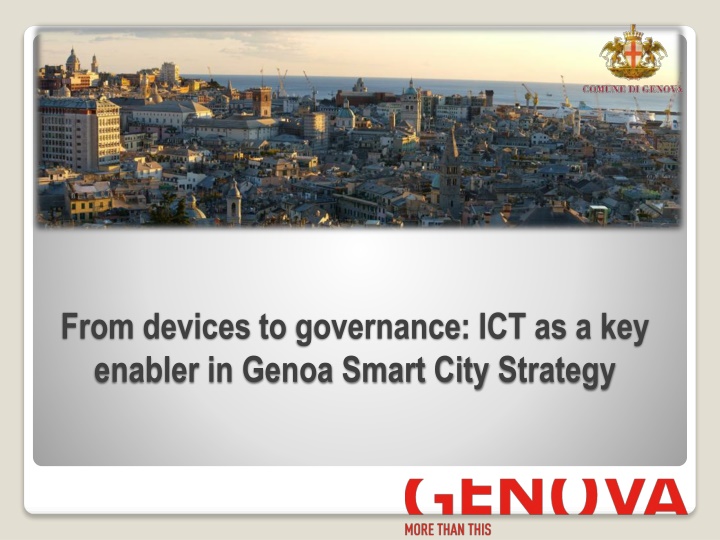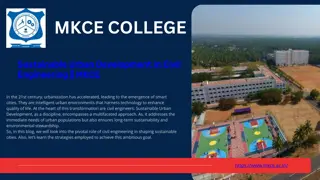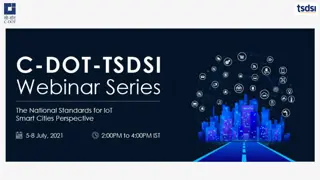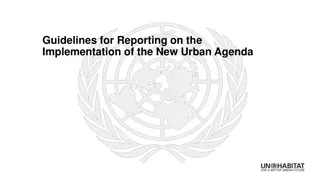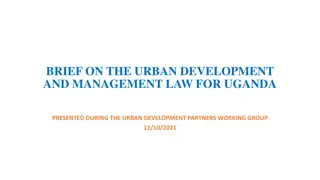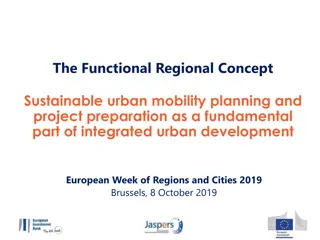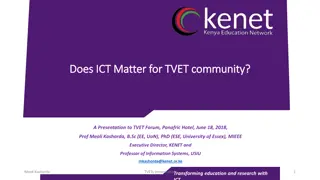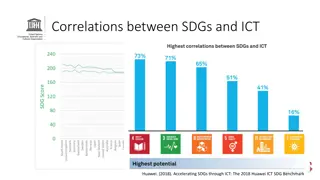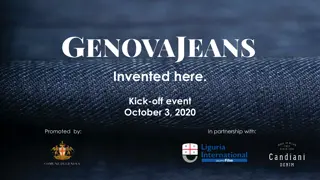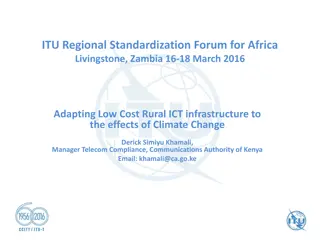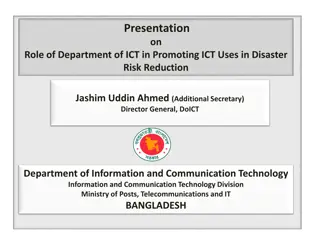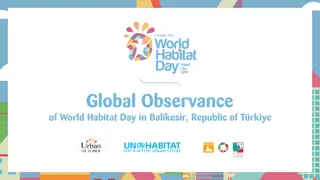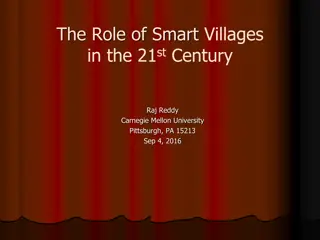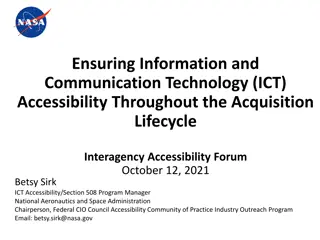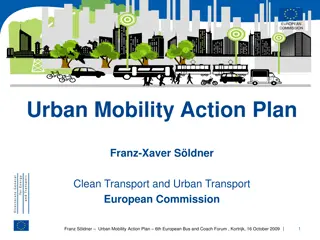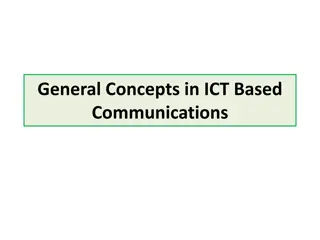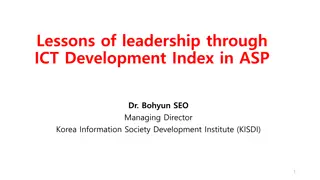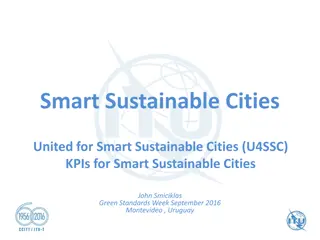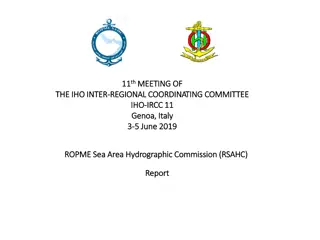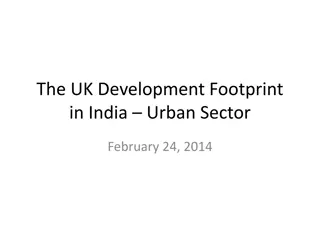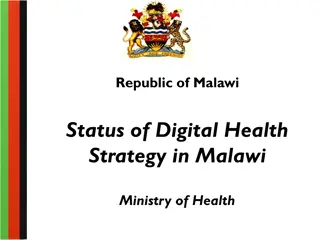Genoa Smart City Strategy: Leveraging ICT for Sustainable Urban Development
Genoa's Smart City Strategy emphasizes the pivotal role of ICT in fostering sustainable urban development. The city envisions a future where interconnected devices and advanced governance systems work synergistically to address environmental challenges and enhance overall quality of life. Through collaborative efforts between public and private sectors, Genoa aims to create a smart ecosystem that integrates various components to tackle urbanization, energy consumption, and population growth effectively. The Genova Smart City Association, established in 2010, plays a key role in facilitating this transformation by engaging key stakeholders in research, businesses, institutions, finance, and the community.
Download Presentation

Please find below an Image/Link to download the presentation.
The content on the website is provided AS IS for your information and personal use only. It may not be sold, licensed, or shared on other websites without obtaining consent from the author.If you encounter any issues during the download, it is possible that the publisher has removed the file from their server.
You are allowed to download the files provided on this website for personal or commercial use, subject to the condition that they are used lawfully. All files are the property of their respective owners.
The content on the website is provided AS IS for your information and personal use only. It may not be sold, licensed, or shared on other websites without obtaining consent from the author.
E N D
Presentation Transcript
From devices to governance: ICT as a key enabler in Genoa Smart City Strategy
Introduction The energies, but also changes human consciousness. We are in the early stages of a transformation to biosphere consciousness. When each of us is responsible for harnessing the Earth s renewable energy in the small swath of the biosphere where we dwell, but also realize that our survival and well being depends on sharing our energy with each other across continental land masses, we come to see our inseparable ecological relationship one each other. We are beginning to understand that we are as deeply connected with one another in the ecosystems that make up the biosphere as we are in the social networks of the Internet. Jeremy Rifkin (UTRECHT ROADMAP TO A THIRD INDUSTRIAL REVOLUTION) new communication revolution not only organizes renewable " The internet of things, (I.o.T.) which incorporates intelligence in everyday objects, is the next great invention. My intention is to promote an internet of things which is functional to our economic and social objectives and at the same time ensuring the safety and respect the privacy and ethical values . Neelie Kroes
Future Scenarios as regards Cities : Urban population will grow in the coming years by an estimated 2.3 billion and will be as much as 70% of planet s population Cities are responsible for 80% of greenhouse gas emissions and consume 70% of world energy. up to 300.000 people/day from countryside to urban areas as regards Technology : Objects approximately 20 billion in 2015 to over 50 billion by 2020. connected to Internet will increase from
We need new models to tackle these scenarios Smart Cities, Future Internet and PPP to meet the challenge ICT is already at the heart of many current models for single drivers: transport management , pollution monitoring, risk management, ecc. We need to think of an ecosystem where the single components are integrated and interact one to each another Where each layer has a well-defined function, certain rules of operation and contributes to the proper functioning of the system Future challenges cannot be overcome without the effort of all the players involved in
Genova Smart City Association Founded in 2010 Designed to consolidate and facilitate the process of transformation into a smart city and to engage key partners to undertake the virtuous path: research, enterprises, institutions, finance and citizens. Today the Association has more than 80 members This model of partnership is based on voluntary cooperation between the public and private sectors
Future Internet Strategy A model composed by different layers Semantic web Big data Analytics Governance Cloud Big data S.O.A. Interoperability Console Management Apps B.I. Web Social Networks Internet of Services Sensors Devices Internet of Things Fiber wireless Ultra Broadband
Genoa Smart City Strategy Based on 4 pillars: Smart Grid Green energy Less consumption Behavioural changes Energy Intelligent Transport System Infomobility Local transport System Behavioural changes Transport Smart metering Retrofitting Heating & cooling District Building Safety & Security Risk prevention system Video surveillance system ..
Genoa Smart City Strategy to provide 4 fundamental requirements: Balanced Resilient Adaptive Open Able to find the best possible use of all resources and factors able to withstand stress and catastrophe able to change easily when needed able to interact with the external environment
From bytes to Governance Energy Mobility Governance Buildings Safety & Security . .Energy Manage ment .Mobility Manage ment .Building Manage ment Risk Manage ment Ultra Broadband Sensors / devices
Ultra broadband Some highlights the widespread dissemination of connectivity is the essential enabler to begin construction of the I.o.T. The partnership development necessarily requires a public-private The model foresees for agreements with telecommunications companies, define clear rules in order to: plan the infrastructure development on a shared basis overcome the existing digital divide share the infrastructure lay the foundation for creating new services
I.o.T. - I.o.S Some highlights Create platforms to overcome the barriers between specialized systems. Define new models of sustainable participatory management Define new models to provide Services of public interest Choose standards between sensors and platforms How to approach the cybersecurity risks Ownership and responsibility of informations
Interoperability Some highlights we need to rethink the ICT model applied to adapt to new scenarios the new model is based on S.O.A. (service Oriented Architecture) in the development of our ICT platforms we participation in some European projects are speeding up the transition to the cloud through
